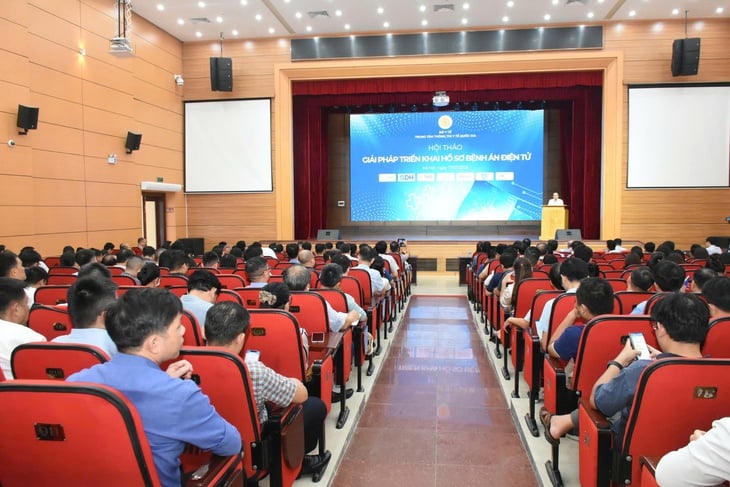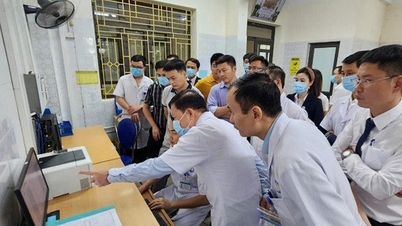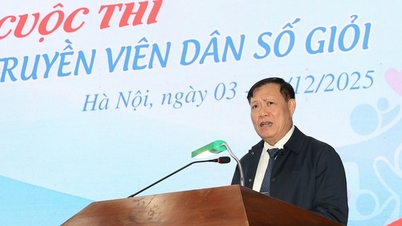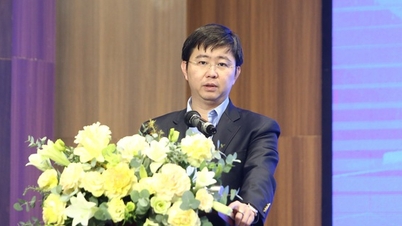
Overview of the workshop "Solutions for implementing electronic medical records" on July 17 - Photo: D.CUONG
On July 17, in Hanoi, the National Center for Health Information ( Ministry of Health ) organized a workshop on "Solutions for implementing electronic medical records" to promote digitalization progress in the health examination and treatment system nationwide.
Many challenges in human resources and infrastructure
Speaking at the workshop, Mr. Do Truong Duy, Director of the National Health Information Center, emphasized that electronic medical records are one of the important pillars in the digital transformation roadmap of the health sector. The implementation of this system not only helps improve the quality of medical examination and treatment but also optimizes the management, storage and sharing of medical information.
"Electronic medical records ensure accuracy, transparency, connectivity and confidentiality of people's health information," said Mr. Duy.
However, he also frankly admitted that the implementation process is still facing many barriers, from funding sources, technological infrastructure, professional human resources to technical standards and inter-sectoral coordination.
To date, only 270 medical facilities nationwide have announced the completion of electronic medical records, a modest number compared to the national target.
"Many facilities still face difficulties in raising funds, upgrading IT infrastructure and lacking digitally savvy human resources," Mr. Duy explained.
Mr. Nguyen Minh Duc, Director of the Ha Tinh Department of Health, said that the locality is making efforts to implement electronic medical records according to the roadmap of the Ministry of Health, with the goal of announcing completion in September. The whole province currently has 6 general hospitals, 6 provincial-level specialized hospitals, 13 medical centers and many public-private medical facilities entering the trial operation phase.
"Implementing electronic medical records is an inevitable trend in the technology era, bringing practical benefits such as storing and retrieving information quickly, reducing administrative procedures and connecting data across the health sector. But in reality, we are facing many barriers," Mr. Duc shared.
According to him, many hospitals in Ha Tinh still use old computer systems and weak network connections, especially in remote areas where there are still many "dip points" in signal. Information technology personnel at the facilities are mainly part-time and lack proper training.
Even people, especially the elderly, are not yet familiar with using digital utilities such as chip-based citizen identification cards or cashless payments, slowing down the conversion process.
In addition, according to Mr. Duc, the cost of implementing electronic medical records is not yet included in the price of medical examination and treatment services, making it difficult for public health facilities to arrange investment budgets.
"Ha Tinh province has proactively allocated local budgets for initial support. But for sustainable development, it is necessary for the Ministry of Health to soon amend policies so that technology services can be included in the price structure of medical services," he proposed.
Towards the goal of 100% completion of electronic medical records
According to Mr. Hoang Van Tien - Deputy Head of the Department of Solutions and Quality Management (National Center for Health Information), one of the biggest problems today is that the bidding procedures for purchasing information technology equipment are still complicated and lengthy, affecting the implementation progress at many medical facilities.
In addition, requirements for information security, management software, and technical infrastructure all require synchronous and long-term investment.
In order to remove these bottlenecks, last June the Ministry of Health issued new guidelines, and the National Center for Health Information also issued a document with specific technical requirements.
"These documents help standardize processes, creating a clearer legal and technical basis so that hospitals can deploy on schedule," said Mr. Tien.
Despite many challenges, Mr. Tien said that the past two months have witnessed a clear acceleration, with 60-70 facilities announcing completion each month. He also expects that, with close direction from the Government and synchronous coordination between localities, the goal of completing the implementation of electronic medical records at 100% of medical facilities will be completed on schedule.
At the workshop, many technology units also offered infrastructure solutions, information connections, and technological guidance for medical facilities to implement.
Source: https://tuoitre.vn/day-nhanh-trien-khai-benh-an-dien-tu-loi-ich-ro-rang-nhung-con-nhieu-thach-thuc-20250717123428212.htm






![[Photo] Cat Ba - Green island paradise](/_next/image?url=https%3A%2F%2Fvphoto.vietnam.vn%2Fthumb%2F1200x675%2Fvietnam%2Fresource%2FIMAGE%2F2025%2F12%2F04%2F1764821844074_ndo_br_1-dcbthienduongxanh638-jpg.webp&w=3840&q=75)
























































![[VIMC 40 days of lightning speed] Da Nang Port: Unity - Lightning speed - Breakthrough to the finish line](https://vphoto.vietnam.vn/thumb/402x226/vietnam/resource/IMAGE/2025/12/04/1764833540882_cdn_4-12-25.jpeg)












































Comment (0)